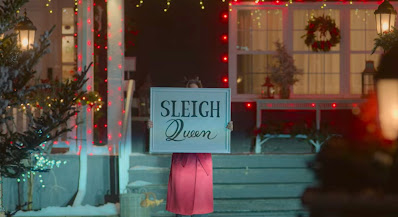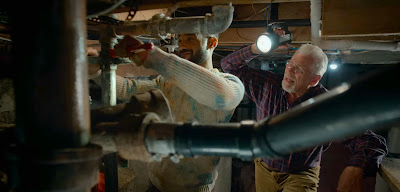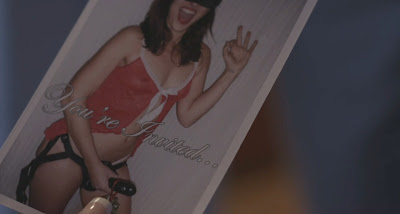 |
Jackie Collins was the Lady Boss of
trash fiction in the 1970s and ’80s.
|
One of the many depressing aspects about the success of
Fifty Shades of Grey was that it highlighted how adult fiction had become so tame by 2011 that E.L. James’ rape-y
Twilight fan fic could not only became a pop culture phenomenon but also be discussed by the amnesiac media as if smut had never before dirtied the
New York Times Best Seller list.
The
NYT Best Sellers had been sullied long before James came along, and on a monthly basis, too. Among those regularly defiling popular literature in the 1970s and ’80s were Harold Robbins and Jackie Collins. Though Rosemary Rogers and Judith Krantz gave them a run for their money, Robbins and Collins had succeeded in making their names synonymous with raunch. Rogers and Krantz wrote racy romances; Robbins and Collins wrote
trash.
I was more of a fan of Harold Robbins’ books, but Jackie always seemed a far more likable person, and watching the 2021 documentary LADY BOSS: THE JACKIE COLLINS STORY, currently streaming on Netflix in the U.S., confirmed the late author’s likability. She’s so likable, in fact, that no fewer than four women interviewed identify themselves as Jackie’s best friend.
Jackie’s story is told through interviews with her older sister (you know who), her three daughters, Tracy, Tiffany and Rory, and numerous friends and business associates. Director Laura Fairrie’s best source, however, is Jackie herself, not only from archive footage but from a treasure trove of diary entries, journals and an unfinished autobiography, Reform School or Hollywood.
 |
| Teen-aged Joan and Jackie Collins. |
 |
Jackie failed to make a
splash in the 1957
movie All at Sea.
|
Of course, much of Jackie’s story has likely already found its way into her novels in one way or another as her life could be the basis of a Jackie Collins book. It’s a life that includes a domineering father (Joe Collins was temperamental theater agent prone to flying into rages at the dinner table), sibling rivalry (Jackie struggled to establish an identity beyond “Joan Collins’ little sister”), an ugly duckling-to-swan transformation (Jackie matured into a shapely young woman, helping things along with a nose job in 1959), wild times in Hollywood (including a fling with Marlon Brando, whom Jackie describes in a diary entry as “kind of fat”), an acting career that goes nowhere (appearing in the Alec Guinness film
All at Sea and a guest spot on TV show
The Saint are her more notable credits), and an unhappy marriage (Jackie’s first husband Wallace Austin was a bipolar drug addict who committed suicide a year after their divorce in 1964).
 |
Look back in leopard print: Jackie with her first born, Tracy,
and Jackie’s mother, Elsa Collins.
|
It’s not until Jackie’s second husband, nightclub owner Oscar Lerman, encourages Jackie to finish a novel she’s all but given up on that Jackie pursues writing with any real ambition. “I’d been writing all my life,” Jackie recalls. “I’d written a lot of half-books that I never finished, and he was the first person that said to me, ‘It’s absolutely terrific and you can do it’.”
That book was The World is Full of Married Men, and Jackie sold it to a publisher for £400 ($536 U.S.). To say that the publisher got a huge return on its investment is an understatement. The book’s mix of strong women and sizzling sex made it an instant—and controversial—best seller in 1968.
 |
Jackie at work, exactly as you imagine.
|
As the documentary details Jackie’s ascension on the best seller lists, it focuses more on Jackie as a celebrity than a writer. Even her former agent Morton Janklow puts more stock in Jackie’s TV appearances than her prose: “It was one of the reasons she was so successful. She could go out there and promote those books and not be embarrassed.” Her Mob Wives aesthetic—big hair, big shoulder pads, lots of leopard print—was just another aspect of her branding. She looked like a character from one of her books, making her their ideal spokesperson. Lady Boss is peppered with clips of Jackie promoting her work, including a 1980s TV ad in which Jackie urges readers to “get Lucky.” (The voice heard at the end of the clip below is Jackie’s oldest daughter, Tracy.)
Two aspects where I feel Lady Boss drops the ball is that it fails to give viewers a sense of the book market of the 1970s and ’80s (timing plays a role in Jackie’s success as much as her storytelling talent) or acknowledge those who came before her. It’s admirable that Jackie was an active participant in the marketing of her books, but she was hardly the first author—or the first Jackie—to do so. That the documentary fails to pick up on the many similarities between Jackie’s and Jacqueline Susann’s lives and careers is Lady Boss’s biggest oversight.
 |
Jackie looms over Hollywood.
|
Lady Boss makes it abundantly clear that Jackie took a lot of shit for her books. The documentary tries to attribute this as mere sexism, i.e., people disapproved of a woman writing bluntly described sex scenes (Fairrie includes plenty of footage of Jackie being scolded and/or belittled by male talk show hosts). Lady Boss even tries to frame Jackie as some sort of feminist icon. Though the author did self-identify as a feminist, her brand of feminism didn’t seem to go beyond speaking out against the double standard. Women should be permitted to be as shitty as men, while true, is not the sort of rallying cry that would land her on the cover of Ms. magazine.
 |
The 1980s, when Jackie ruled trash fiction and Joan ruled
Prime Time.
|
The documentary also touches on the rivalry between Jackie and her older sister. Joan says that Jackie hated a couple men in her life (she doesn’t name names), and that these men also hated Jackie, and so things were a bit chilly between the sisters during these relationships. Though they teamed up to adapt one of Jackie’s bestsellers,
The Stud, into a movie vehicle for Joan in 1978, and its sequel
The Bitch in 1979, things were again reportedly tense in the 1980s when Joan, at the peak of her
Dynasty career revival, tried her hand at trash fiction, starting with her 1988 debut novel
Prime Time. Jackie was none too happy that Joan was trespassing in her territory, so it’s not surprising she felt some schadenfreude when Joan’s subsequent books for Random House were deemed
“unpublishable.” On the subject of Joan—excuse me, Dame Joan—I did not always believe she was speaking candidly. Though she doesn’t appear to view her and Jackie’s relationship through rose-colored glasses, she’s careful to present herself as the ever-supportive older sister. (People without siblings might believe that, but rest of us aren’t buying it, Joan.) I also got the idea—through tone of voice and body language—that a few people interviewed didn’t have particularly high opinions of Jackie’s famous sibling. When Joan’s anecdote about Jackie’s spirit inhabiting a persistent fruit fly (seriously) is referenced, Jackie’s former assistant all but rolls her eyes and says her former boss's sister is full of shit.
From the Lost Years: A Supplemental Book Review
 |
Jackie’s 2009 novel Poor Little Bitch
Girl. Love the title, hate the book.
|
Jackie’s life wasn’t as rosy during the 1990s and 2000s. In 1992 her husband Oscar died of prostate cancer. And though it’s only briefly touched on, Jackie was also losing her mojo as an author. Her books in the latter half of her career, while still best sellers, weren’t selling as well as they once had. “We changed as a world,” says Jackie’s publicist Melody Korenbrot, adding that Jackie tried to change with it. “She sat down and wrote, but eventually she became completely confused and lost.”
Judging by her 2009 novel, POOR LITTLE BITCH GIRL, Jackie was still lost in the late 2000s.
I’ve enjoyed a few of Jackie’s books, including The Hollywood Zoo, the 1975 a.k.a. of Sunday Simmons & Charlie Brick (the title later changed again to Sinners) and her 1983 mega-hit Hollywood Wives, perhaps the best thing she’s ever written (but still trash). Unlike grump Harold Robbins, Jackie didn’t take herself too seriously, her writing giving the impression she was chuckling right along with the reader.
Reading Poor Little Bitch Girl, you still get the impression she’s not taking herself too seriously, only this time the tone is less a conspiratorial chuckle and more of a “Whatever,” sighed under her breath.
Poor Little Bitch Girl is the ninth installment in the Lucky Santangelo series, but the story pretty much stands on its own. Lucky herself is hardly in the thing. Instead, the novel revolves around four separate main characters: Annabelle Maestro, the estranged daughter of movie star parents, now running an escort service in New York with her cokehead boyfriend Frankie; Denver Jones (these names...), a one-time classmate of Annabelle’s, now a lawyer for an elite L.A. firm; Carolyn Henderson, a longtime friend of Denver’s, working in Washington, D.C. as Sen. Stoneman’s assistant (and his mistress); and Lucky’s son Bobby Santangelo Stanislopoulos, who runs a successful NYC nightclub and who was also once a classmate of Annabelle’s and Denver’s. None of these characters are older than 26, all of them are hot, and they all have the emotional maturity of junior high students.
The murder of Annabelle’s mother, Gemma Summer, is what sets the book’s story in motion, with Denver—whose firm is representing Annabelle’s father, the prime suspect—sent to New York to retrieve the titular poor little bitch girl. Denver hates the assignment, until she runs into Bobby. Meanwhile, in Washington, D.C., Carolyn is kidnapped just days after telling Sen. Stoneman that she’s pregnant with his baby. It’s a good thing Bobby, who is just as smitten with Denver, has a private plane and thinks nothing of using it to fly her to D.C. to look for her missing friend.
If you read the above paragraph and asked yourself, Wait, shouldn’t the driver of the story be Denver trying to solve Gemma Summer’s murder? then you clearly aren’t in the right headspace for a Jackie Collins novel. That murder is merely incidental. What matters is that Denver bangs a hunky journalist in L.A., then a sensitive screenwriter in New York, and then falls for Bobby Santangelo Stanislopoulos (though she has trouble forgiving him getting a b.j. from pop singer Zeena, a Cher/Madonna hybrid who speaks of herself in the third person). Even Carolyn’s disappearance is secondary to Denver finding a man. Why waste time cutting into the meat of the story when you can eat Reddi-Wip directly from the can?
Worse than the book’s mishandled plot is its one-note characterizations. Annabelle is selfish and bitchy; Frankie is an asshole; Bobby is charming; Denver is headstrong and kind of kooky (and evidently meant to be a Julia Roberts-type character as Denver is compared to Julia in more than once instance); Carolyn is a hopeless romantic. Jackie, preferring to tell rather than show, often assigns labels for her characters, declaring that Denver and Carolyn are independent and smart, yet Denver is always getting rescued by men and Carolyn just wants Sen. Stoneman to leave his wife for her, and the idea that either of these women have more than a high school education strains credulity. You’d have an easier time believing Denver, whose chapters are written in the first person, is a 16-year-old inhabiting the body of her attorney older sister, Freaky Friday-style, than buy her as a member of the bar.
Why waste time cutting into the meat of the story when you can eat Reddi-Wip directly from the can?
But, hey, at least there’s all that graphic sex Jackie is known for, except, nope, not in
Poor Little Bitch Girl. Sex may be at the forefront of every character’s mind—second only to money—but Jackie backs away from detailing any bedroom activity, preferring to just have her characters give generalized postmortems instead (
“I liked that he took his time, kissing me everywhere—and I do mean everywhere
”). Considering the first Lucky Santangelo novel, 1981’s
Chances, includes a scene in which Lucky’s father, Gino, slurps his spooge out of the pussy he’s freshly plowed—and described about as delicately—
Poor Little Bitch Girl is practically PG-13. But then, we didn’t have PornHub in 1981, so maybe by the 2000s Jackie figured she’d just let the Internet fuel the horny imaginations of her readers.
In the book’s defense, it does have an awesome title. Also, it’s fairly well-paced and I was invested in the story enough to want to keep reading. Except, by the time I reached the end I regretted wasting my time with it. Jackie never pretended to be a great writer, but she wasn’t even trying here. This wasn’t the work of an author trying to push herself to be better than her last book; this was a brand name trying to fill enough pages to get a new hardcover on shelves before her previous best-seller landed in the remainder bin. It’s not a novel, it’s product.
Admire Her Spirit if Not Her Books
After her husband’s death Jackie eventually took up with businessman Frank Calcagnini for a very long engagement (the pair never married). If
Lady Boss interviewees can’t say enough good things about Oscar Lerman, they struggle to say anything nice about Calcagnini. The way Tita Cahn, one of Jackie’s many best friends, describes him, he could well have been the inspiration for the character of Frankie in
Poor Little Bitch Girl: “He was a gambler, a drugger [sic], an alcoholic and an abuser.” About the kindest words anyone can muster for Calcagnini is that he
could be charming. When Calcagnini died of a brain tumor in 1998 few people—other than Jackie—mourned his passing.
 |
Jackie Collins in a British TV appearance
shortly before her death.
|
Unlike her late fiancée, Jackie’s passing was deeply felt by all who knew her. Jackie had been diagnosed with breast cancer years before her death, but like her mother before her, she kept her illness a secret, and like her late-husband Oscar, chose to keep working until the very end. Lady Boss includes a clip of Jackie on the British talk show Loose Women made during her final days and her appearance is startling. She looks gaunt, frail, a good ten years older than her older sister. Still, she never lets on that she’s sick. Nine days after this TV appearance, on Sept. 15, 2015, Jackie Collins died. She was 77.
In watching Lady Boss: The Jackie Collins Story I came to see Jackie as an entertainer, just one who wrote tawdry beach reads instead of performing live at Caesar’s Palace. The documentary also strengthened my appreciation of her as a person. I just wish I could like her books as much as I like her. Still, I’d read Jackie over E.L. James any day.


































